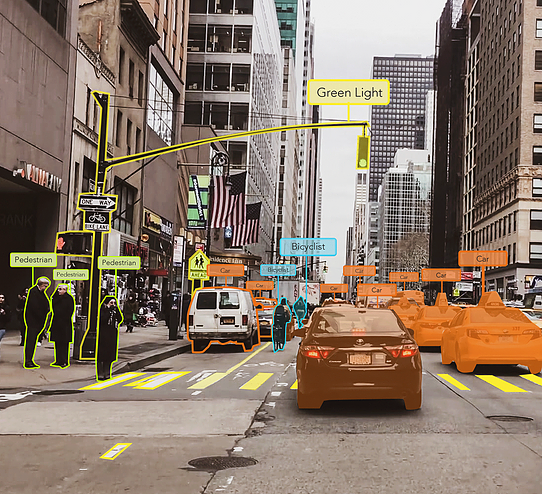One Startup To Know: Hayden AI
Learn how Hayden AI developed an autonomous perception system that creates digital twins of cities to help automate traffic enforcement

Welcome to One Startup to Know. This series examines some of AV’s most impactful and innovative portfolio companies that exemplify our investment ethos. This week, we’re showcasing Hayden AI.
Want to learn more?
View all our available funds and secure data rooms, or schedule an intro call.
New to AV?
Sign up and access exclusive venture content.
Hayden AI has developed an autonomous perception system using mobile sensors and traffic data to generate real-time digital twins of cities to help automate traffic enforcement.
As the AI revolution accelerates, startups like Hayden are becoming instrumental in creating the data needed by AI systems to operate in the real world. Hayden Co-Founder and CEO Chris Carson is leading a team of experts in machine learning, data science, and transportation to help municipalities and police departments bridge the AI innovation gap.
One Startup You Need to Know: Hayden AI
See video policy below.
See below to read our interview with Chris for his perspective on what challenges Hayden solves for its clients, why he founded Hayden, and what the future holds for his ambitious startup.
Hayden AI has developed an autonomous perception system using mobile sensors and traffic data to generate real-time digital twins of cities. The company analyzes a city’s existing transportation fleet to simulate traffic scenarios and provide actionable insights — helping improve traffic flow and safety. The goal is to take humans out of the loop and automate traffic enforcement, allowing municipalities and police departments to focus on more important work. Read More »
What problem or opportunity is Hayden addressing?
We’re building perception systems that have complete spatial awareness and the ability to see and reason in 3D. So not cameras, not smart cameras, not even vision systems. It’s really autonomous vehicle technology achieved through precision localization, computer vision, and using mapping layers as a super sensor.
We’re applying this technology to a very specific use case: traffic enforcement. We can tell you exactly where a car is parked and identify any traffic violation. By taking humans out of the process, we can automate traffic enforcement completely and let police focus on more important activities while reducing fatalities, promoting fair and equitable mobility, and removing bias from the system.
What inspired your decision to launch Hayden?
I was on a transit bus in San Francisco, and I kept seeing the bus driver pushing a button. I realized that he had a camera in his window, and he was recording an ”evidence package“ every time he saw a car parked in the bus lane or a bus stop. I thought, we can definitely automate that and let bus drivers focus on driving. We’re using buses as our beachhead as we create that roadmap, and our system continues to handle more vehicles and use cases.
Ultimately, our goal is to focus on police cars and find ways to improve policing in a way that benefits both society and the police. I don’t think people sign up to become police officers to write tickets and monitor traffic. I look at the current system and think, “How ’80s.” Somebody actually has to pull you over and handwrite a ticket? The inefficiency just doesn’t make sense to me. Instead, let’s put devices in government fleet vehicles and automate the entire process. Let’s make it more efficient, remove bias, and focus on traffic enforcement initiatives that create more fair and equitable mobility.
What unique challenges and opportunities do you experience as an AI-focused company?
I think ethics is probably our biggest concern. As an AI company, you have to determine whether or not you’ve trained your machine learning models in some fashion that might have a bias. For example, you may have trained your system with white and black cars, and now it doesn’t pick up blue or red as a result. You have to be really careful that you’re not creating more bias through technology. We’ve spent a lot of time making sure that there’s no bias in our algorithms. It’s really important to us that we’re building technology that’s trusted by the communities we serve.
What is next on the horizon for your organization, and how can our community support you?
We’re growing really quickly. We’ve raised $45.3 million since 2019. We went from 15 to 60 people in 2021, and we’re planning go from 60 to 120 people by the end of 2022. When you have that kind of growth, you need a lot of support because you don’t want things to break. We need to hire the right talent so that we can not only execute our mission, but also maintain the right corporate culture, which is equally important. We’re always trying to tap into our network and our investment partners’ networks and see how they can help us recruit the best talent we can.
Why did you decide to partner with Alumni Ventures?
We came from a UC Berkeley accelerator, and we had a lot of early support and mentorship from groups like MIT Angels and other investors that are associated with universities. We felt like that association gave us a halo effect, and we wanted to continue tapping into those resources. Alumni Ventures was a really good fit, especially because we’re both closely aligned with some of the same alumni communities.
Want to learn more?
View all our available funds and secure data rooms, or schedule an intro call.
New to AV?
Sign up and access exclusive venture content.
Contact [email protected] for additional information. To see additional risk factors and investment considerations, visit av-funds.com/disclosures.


